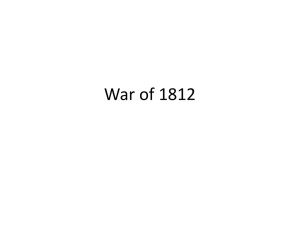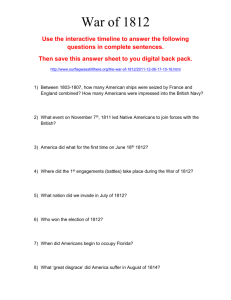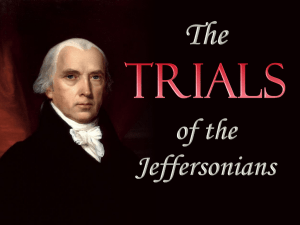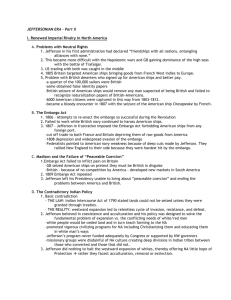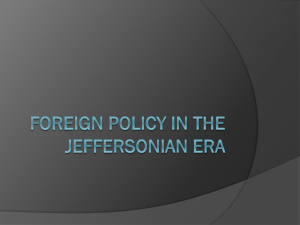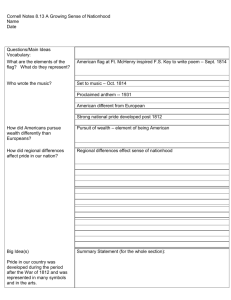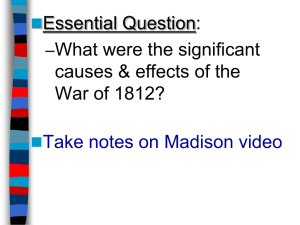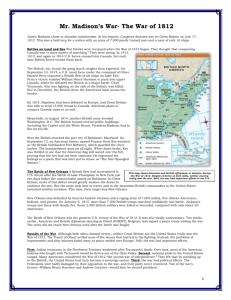The War of 1812 - WLWV Staff Blogs
advertisement
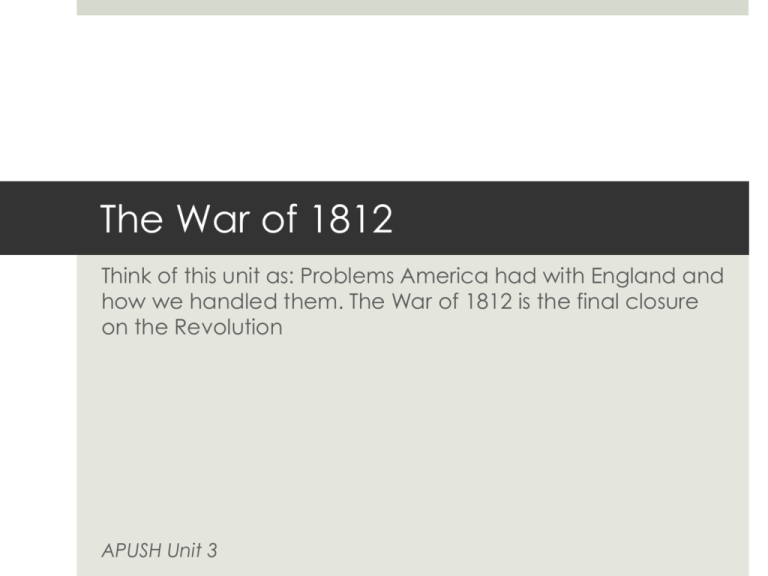
The War of 1812 Think of this unit as: Problems America had with England and how we handled them. The War of 1812 is the final closure on the Revolution APUSH Unit 3 Backstory? What problems with England and France occurred during Adams’ Presidency? How did America respond? Heading towards War America as Neutral Problems in Europe Napoleon starts fighting with England again (intentionally) America enjoys trading with both until 1805 England controls the seas after the Battle of Trafalgar France controls the continent after the Battle of Austerlitz Problems with England Orders of Council – 1806 England closed the ports under French continental control to foreign shipping unless the vessel stopped at a British port first French reaction: seizure of all merchant ships that entered British ports Impressment of Sailors 6000 men between 1808-1811 Problems with England Chesapeake / Leopard Affair of 1807 British frigate Leopard overhauled the US frigate Chesapeake 10 miles off of Virginia Demanded the surrender of 4 alleged deserters Problem was London had never claimed the right to impress from a foreign warship (just a merchant ship) American commander refused and fought, but lost – 3 Americans killed and 18 wounded 4 “deserters” were dragged away London foreign office apologized Americans were VERY angry Problems with England Jefferson’s Response: Forbade British ships to dock in American ports. Ordered state governors to call up as many as 100,000 militiamen. France’s Continental System Since Napoleon controlled most of Europe, he forbid all European countries from trading with England The Embargo Act of 1807 America couldn’t submit, but Jefferson didn’t want war and we had a poor navy and army Instead America tried economic fighting Europe (both sides) depended on America for raw materials and food Embargo Act passed in 1807 Forbid the export of ALL GOODS from America in either American or foreign ships How is America doing with the embargo? 1807 exports $108 mil. 1808 exports $22 mil. Terrible Shipping industry in NE ground to a halt People were unemployed Farmers in the South and West had mountains of cotton, grain, and tobacco and no one to sell it to! How is America doing with the embargo? People began to make fun of Jeff and the embargo New England talked of secession Why didn’t embargo work? Too short Too much smuggling Latin America shipping to England and France Good crops in England during these years Non-Intercourse Act of 1809 Finally Congress had to change things Non-Intercourse Act of 1809 (3 days before Jefferson’s retirement) Reopened trade with all nations except for England and France Effects of the Embargo Embargo much more costly than war Could have built a navy with that money…didn’t Revived Federalist party – a little IRONY: Actually benefited New England since they turned to reenergizing their factories and industry Foundations of America’s industry were laid by Jefferson who hated industry… Great suffering in England Parliament repealed the Orders of Council 2 days before Congress declared war in 1812 If only there were telephones… Presidential Election of 1808 James Madison Couldn’t handle the factions within his party Wife, Dolly Madison, is credited with creating the role of “First Lady” Macon’s Bill Number 2 Created to replace the expiring NonIntercourse Acts Permitted America to trade with the world America would trade with either England or France - whichever repealed its commercial restrictions first AND not trade with the other This was made for Napoleon who jumped on it Madison aligning with France meant he was aligning AGAINST England War Hawks in Congress “Free Trade and Sailors’ Rights” and Free Land Mainly western settlers Younger generation that were excited about a Patriotic fight Clay and Calhoun Problems on the Frontier Native Americans were upset about white settlement in Kentucky – a buffer state and game preserve for the North and South tribes. Native Americans began to unite under Tecumseh and the Prophet – two Shawnee brothers Tecumseh The Prophet Problems with the British and Indians War Hawks in Congress were convinced that the British were helping the Native American movement led by Tecumseh British General Brock meets with Tecumseh Fighting the Indians General William Henry Harrison was sent to fight the Indians at Tecumseh’s headquarters of Tippecanoe on November 7, 1811 Tecumseh continued to fight with the British against the Americans and was killed at the Battle of the Thames in 1813 This was the last hope of an Indian Confederacy East of the Mississippi Andrew Jackson crushed the Creek Indians at the Battle of Horseshoe Bend on March 27, 1814 Fighting the War of 1812 Just Keep Fighting… Many War Hawks in Congress felt that the only way to crush the Indians permanently was to defeat their allies in Canada “On to Canada, On to Canada” Declaration was issued in June of 1812 and passed with a close vote Most supporters came from landlocked southwest and west Even though this all started with trade and impressment issues Mr. Madison’s War Federalists and New Englanders bitterly opposed the war Were still profiting off of trade Hated Napoleon Lent money to England and sent food and supplies to British troops in Canada Much national disunity at this time… Election of 1812 American Problems During the War The US was unprepared militarily: Had a 12-ship navy vs. Britain’s 800 ships. Americans disliked a draft preferred to enlist in the disorganized state militias. Led by “semi-senile heirlooms” from the Revolutionary War Financially unprepared: Flood of paper $. Revenue from import tariffs declined. Regional disagreements. 1813 Campaigns Purple attacks were lost by the US Blue were won by the US Perry’s victory on Lake Erie: “We have met the enemy and they are ours” 1814 - America was defending its own soil Napoleon had been exiled by mid-1814 and British turned attention to US British tried to invade N. New York through the lake/river route and had to ship their supplies over the lake Champlain waterway American fleet, led by Thomas Macdonough challenged the British and were about to lose when Macdonough swung his ship around with cables and hit the enemy broadside (September 1814) Yay for America Upped American morale British had to retreat Affected treaty negotiations in Europe Burning of Washington D.C. 4000 British troops landed in the Chesapeake in August 1814 Advanced on Washington Dispersed 6000 militia Invaders set fire to the capital British fleet attack Baltimore Beaten by Fort McHenry Francis Scott Key was an American detained on a British ship when he wrote the Star Spangled Banner “bombs bursting in air” New Orleans In late 1814, the British attacked New Orleans to halt trade on the Mississippi They were met by Andrew Jackson and his rough forces (7000) Including two Louisiana regiments of free black volunteers ~ 400 men Americans entrenched themselves and were attacked by 8000 veteran English soldiers, but with a frontal assault Attackers suffered the worst defeat of the war New Orleans Battle happened 2 weeks after the peace treaty had been signed at Ghent Still made Jackson a hero The Treaty of Ghent In 1814 envoys from both nations met in Ghent, Belgium England made huge demands JQA and Henry Clay from US Neutralized Indian buffer state in the Great Lakes Control of the Great Lakes Much of Maine Americans said no and talks stalled…until…word of reverses in upstate NY and Baltimore caused England to give in more England wanted revenge but didn’t want to pay the price The Treaty of Ghent Signed on December 24, 1814 Ceasefire Restore conquered territory No real issue was addressed “Indian menace”, Impressment, Orders in Council, etc. BECAUSE AMERICA DIDN’T WIN! The war and the treaty were both a draw Federalist Grievances at Hartford New England was still defiant and angry about their economic losses at Hartford so reps from the states met in late 1814 at the Hartford Convention Met for 3 weeks in secrecy to discuss redress for grievances. Demanded: 3 envoys took these demands to the shell of Washington, but they arrived when news of the victory at New Orleans and at Ghent arrived Financial assistance from the gov. to compensate for lost trade Constitutional amendments requiring a 2/3 vote in Congress before: an embargo, admittance of a new state, or war (except in case of an invasion) Looked like idiots; Considered treasonous by some KILLED THE FEDERALIST PARTY Last election was 1816 and they lost terribly Effects of the War of 1812 Small war: 6000 American casualties America was not a wimp Diplomatically could be seen as America’s 2nd war for independence Sectionalism was shot down War heroes emerged Jackson and Harrison become presidents Manufacturing prospered There was never another conflict between England and America and it all worked out No more Federalist Party Effects of the War of 1812 - Nationalism American Culture Develops: Truly “American” authors Washington Irving and James Fenimore Cooper School books now written by Americans, for Americans American magazines American painters Revival of the Bank of the US in 1816 Even nicer looking Washington DC reemerged America won (again) against the pirates of North Africa in 1815

